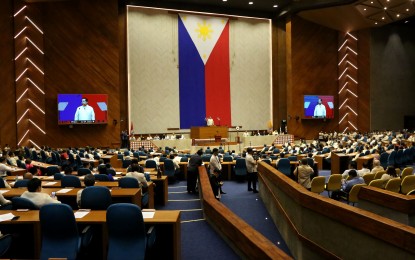
(PNA file photo)
MANILA – The resolution proposing amendments to the 1987 Constitution's restrictive provisions has reached the plenary floor in the House of Representatives, with House Majority Leader Manuel Jose Dalipe assuring that deliberations will be exhaustive.
During Monday's session, the lower chamber opened the period of sponsorship and interpellation for the Resolution of Both Houses No. 7, which seeks to relax restrictions on foreign ownership of public utilities, educational institutions, and advertising industries.
In sponsoring the resolution, Dalipe said the proposed changes to the Charter are essential to propel the country to adapt to a fast-changing global environment and prosper in an "increasingly interconnected world."
"With the increasing interdependence of world cultures and economies, the Philippines cannot remain indifferent, we must adapt and take advantage of the benefits that economic globalization offers and the positive effects it may bring to our country and the Filipino people," Dalipe said.
Dalipe said inserting the phrase "unless otherwise provided by law" would give Congress the authority to alter the economic constitutional restrictions on public utilities, education and advertising, and provide flexibility that the current economic conditions demand.
Dalipe noted that President Ferdinand Marcos Jr. fully supports these "necessary" economic Charter amendments to boost the economic activities in the country while stressing the importance of protecting strategic sectors from foreign control.
He added that Speaker Martin Romualdez shares the President's vision on the importance of amending the economic provisions, which would pave the way for faster and more inclusive economic growth.
"This moment in our nation's history is more than just an opportunity. It's a call to embrace progress, think beyond the present, and work collectively towards economic growth and stability," Dalipe said, as he called on his colleagues to support the approval of the resolution to transform the country's economic landscape.
Dalipe pointed out that before the plenary sponsorship, the House Committee of the Whole spent six days of exhaustive and lengthy deliberations to hear a wide array of resource persons with multi-sectoral and multi-disciplinary expertise.
"The hearings and deliberations conducted by the Committee of the Whole House of Representatives were testaments of our commitment to democratic consultations, where we have allowed everyone to express their views, be they for or against the proposed amendments," he said.
In a press conference, Dalipe said the House is targeting to approve RBH7 on second reading by Wednesday, explaining that the number of members who register with him to ask questions regarding the amendment proposals will determine how much time the House will devote to plenary debates.
“Ine-expect namin na maraming pwedeng magtanong, so we are, binibigyan natin ng tatlong araw na plenary debates ang ating RBH No. 7. Hindi lang isang araw, hindi lang dalawang araw kundi tatlong araw na debates… (We are expecting a lot of questions, so we are allotting three days for plenary debates on RBH No. 7. Not just one day, not just two days, but three days of debates) And hopefully by Wednesday, we can vote on the matter on second reading,” Dalipe said.
Time to amend economic provisions
In his sponsorship speech, Deputy Speaker and Pampanga Rep. Aurelio Gonzales Jr. appealed to the Senate that now is the time to amend the Constitution’s restrictive economic provisions.
“Let us not fail the Filipino people once more. We, in the House of Representatives, have exhausted every step to help our nation. It is time to work collectively and in harmony patungo sa Bagong Pilipinas (towards the New Philippines),” Gonzales said.
Gonzales said certain provisions of the 1987 Constitution, as "noble and well-intentioned" as they are, have already "outlived" their purpose.
“Our mission now is to give the Filipino people that life-long dream of progress for our country, which would in turn raise the quality of their lives,” he said.
He said the proposed constitutional amendment for the public utilities sector could attract substantial investments and spark greater competition, thus leading to improved quality service delivery and high-quality jobs for Filipinos.
Regarding education, he said nurturing intellectual capital is a fundamental strategy to accelerate economic growth.
He said tweaking the constitutional provision on advertising paves the way for Filipino creatives to "be known worldwide.” (PNA)
